Coccidioidomycosis – What’s the Best Test?
At a Glance – Key Points
- Coccidioidomycosis is enzootic in dogs in the southwestern and western U.S.
- Diagnosis is often based on clinical findings and a positive antibody test
- Coccidioides antibodies can be detected via MVista® Coccidioides Canine IgG EIA and fungal immunodiffusion (FID)
- The MVista® Coccidioides IgG Antibody EIA has the advantages more rapid turnaround time and being fully quantitative
- Testing for antibodies with both the MVista® Cocci IgG EIA and FID antibody test is recommended for dogs suspected of having coccidioidomycosis
Case presentation
Presley, a 10-year-old spayed, female chihuahua from Arizona was presented for lethargy, fever (105F), dry cough, and dyspnea. The dyspnea was characterized by increased expiratory effort and an audible wheeze.
Thoracic radiographs showed probable tracheobronchial lymphadenopathy, which was confirmed on a thoracic CT. (Figure 1) Tracheoscopy showed extramural compression primarily of the main stem bronchi.
Coccidioidomycosis was suspected based on the clinical findings and the fact that Presley resided in an enzootic area. A Coccidioides antibody immunodiffusion (FID) test was submitted to a commercial laboratory and was negative. An additional FID test 4 weeks later was also negative. Due to the continued high suspicion for coccidioidomycosis, fluconazole (20 mg/kg/day) was prescribed. Over the following 12 months Presley’s clinical signs and lymphadenopathy resolved. (Figure 2) Follow-up testing of a stored serum sample from the time of diagnosis with a commercially available Coccidioides IgG antibody test (MVista® Coccidioides Canine IgG Antibody EIA) was positive (21.1 EU; >10 EU = positive).
Figure 2. A picture of a right lateral thoracic radiograph showing resolution of tracheobronchial lymphadenopathy after fluconazole treatment.
In Presley’s case, testing for antibodies with the MVista® Cocci IgG EIA at the time of presentation would have confirmed the diagnosis. Being quantitative it would have also provided a potential marker for treatment monitoring. Presley’s case highlights the recommendations discussed below, which include testing for Coccidioides antibodies with the MVista® Cocci IgG EIA and FID in dogs with suspected coccidioidomycosis.
Additional Information
Coccidioidomycosis is the most common invasive fungal infection (IFI) in dogs in the arid southwestern U.S., also being found in the western and southcentral U.S. Clinical signs are dependent upon the body systems affected, commonly limited to the lung and associated lymphatics causing cough, tachypnea, and dyspnea. Other common signs include fever, weight loss, anorexia, lameness and joint effusion, ulcerative or draining skin lesions, and seizures [1
MVista® Coccidioides IgG EIA: low cost, quick turnaround, quantitative
Coccidioidomycosis is often diagnosed with appropriate clinical findings and a positive antibody test. Immunodiffusion is the traditional test for anti-Coccidioides antibodies (aka. agar gel immunodiffusion-AGID or fungal immunodiffusionFID). The FID test detects precipitation when 2 Coccidioides antigens (test reagents) come into to contact with antibodies (from the patient’s serum) after migration through an agarose gel. The interpretation is somewhat subjective and can be delayed for up to 3 days after test set-up. Moreover, for positive results, titers require dilution of the sample and repeated testing requiring up to 3 additional days.
MVista® Coccidioides IgG EIA and FID testing should be done in dogs suspected of having coccidioidomycosis
More recently, MiraVista Diagnostics developed an immunoassay to detect anti-Coccidioides IgG antibodies, (MVista® Canine Coccidioides IgG Antibody EIA). This test improved upon the FID test with a lower cost, quicker result from time of test set-up (<12 hours), and being fully quantitative – all important considerations for diagnosis and treatment monitoring [2
The Coccidioides antibody FID test gives a false negative result in 13% of dogs with biopsy confirmed conccidioidomycosis [3
REFERENCES:
- Sykes J. Coccidioidomycosis. In: Sykes J, ed. Canine and Feline Infectious Diseases. St. Louis, MO: Elsevier; 2014:613-623.
- Holbrook ED, Greene RT, Rubin SI, et al. Novel canine anti-Coccidioides immunoglobulin G enzyme immunoassay aids in diagnosis of coccidioidomycosis in dogs. Medical mycology 2019;57:800-806.
- Gunstra A, Steurer JA, Seibert RL, et al. Sensitivity of Serologic Testing for Dogs Diagnosed with Coccidioidomycosis on Histology: 52 Cases(2012-2013). J Am Anim Hosp Assoc 2019;55:238-242.



